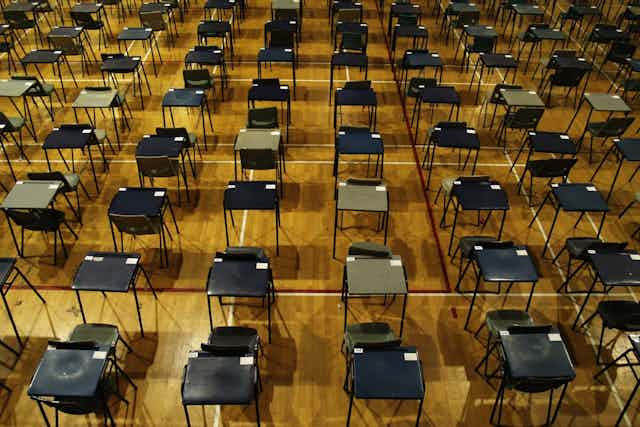With GCSE mock exams well under way, secondary school students will be feeling the pressure. Exam results seem even more important today than they did a few years ago, due to the big changes made to GCSEs and A–levels, designed to make them more rigorous.
In recent years, governments have also introduced new ways of measuring school success, such as the EBacc. So schools are increasingly being judged on how well their students do in English, maths, science, languages and humanities subjects.
This means that schools are expected to produce better results in particular subjects, just when exams have been made more challenging. With students and teachers focused on attaining exam success, what happens prior to the GCSEs is often overlooked.
The stage before GCSEs – known as Key Stage 3 (KS3) – used to be taught for three school years, between the ages of 11 and 14 years old. But under Tony Blair’s New Labour government, schools were given the flexibility to experiment with the KS3 curriculum – and many schools opted to make KS3 shorter, covering Years 7 and 8 only. Data to capture this trend has been sparse. But work I have done with the Historical Association to monitor the state of history education shows that, in 2015, around a quarter of schools surveyed had a shortened KS3. By 2017, this figure was at 45%. This trend was also picked up on during the first phase of a curriculum review carried out by Ofsted.
A narrow focus
On one level, this makes sense – if students start their GCSE courses earlier, they’ll have more time to get to grips with the content and should do better in their final exams. But the GCSE courses have been designed to be taught in two years. The concern is that students will simply spend more time being drilled in exam preparation, rather than learning anything new. KS3 is the only period in a young person’s education where they are entitled to specialist subject teaching across a range of subjects.
Obviously students will get specialist teaching at GCSE. But if a student chooses to stop studying, say, history at the end of Year 8, then they will only have had two years to explore that subject. Over three years, students can have a greater opportunity to develop their knowledge – and hopefully a deeper appreciation – of their subjects.

The danger is that what students study at KS3 become irrelevant. The pressure on schools to perform well in public examinations – and the power of existing accountability measures – means that KS3 is seen as a precursor for GCSE. As a result, only the things that matter for success at GCSE get covered at KS3.
The research that I have been involved in shows that many history departments plan their curriculum content and approaches to assessment based on what they feel is needed for success at GCSE. This can directly affect what happens during KS3, with teachers taking a narrower focus on certain parts of the curriculum to ensure students are ready for their GCSEs.
The clear message from my research – which chimes with what others are also finding – is that schools should think more deeply about the purpose of KS3. It is not simply a preparation for GCSEs – it is there to help young people understand better the world in which they live.
Breathing space
But it’s also clear that many schools and teachers – having been told for so long by governments what to teach, and sometimes even how to teach it – lack the confidence or knowledge to plan interesting, valuable and meaningful curricula.
In a recent small-scale, in-depth study I did of history departments’ curricula, it was evident that many were still teaching what had been introduced with the very first KS3 National Curriculum in 1991. There wasn’t much “big thinking” about the knowledge that young people should develop from the curriculum.
Of course, none of this should denigrate the work of these teachers. But parents and policymakers should recognise that the pressures of league tables effectively force teachers to focus on drilling school students for exams – and this isn’t necessarily the best thing for young people.
Years 7, 8 and 9 should be a breathing space, away from exam pressures, where young people have an opportunity to study subjects that help them to understand the extraordinary and complex world around them – and to think about their place within it.

